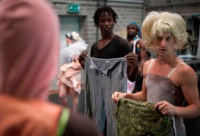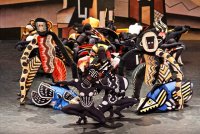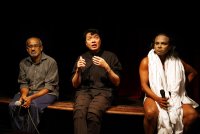TRANSLATING DIFFERENCES

© Martin Rottenkolber
One of the main assumptions regarding cultural translation processes is that forms of transformation and border shifts are at work not only between different cultures but already within cultures. But what is the relationship between these intra- and intercultural conflicts? The complexity of this issue will be discussed at the beginning of the Congress from historical and present-day perspectives. Based on the production ‘La Création du monde 1923 – 2012’ by the Congolese choreographer Faustin Linyekula, postcolonial, philosophical, transdisciplinary, and historical positions will be presented that focus on border shifts and translation processes. With which (verbal) images does one seek to understand the dancing body? Which categories and demarcations are created or possibly abolished again in the process? Which scenarios of visibility and invisibility are embodied and what kinds of (power) constellations of representation, attribution and interpretation are at play? During the course of the lectures and dialogues, seemingly clear boundaries between image and dance, between humans, animals and things will be questioned and historically situated. In further events, the social status of dance and choreography in and between different regions (South Pacific, India, Brazil, Japan, Africa, Europe) are to be exemplarily discussed. Dancers, dance critics and theorists jointly reflect on exchange projects, the associated discourses, and conflicts from a practical as well as dance-theoretical, anthropological and sociological perspective.
Fri, 7 June 10:00
-
10:00 - 11:00 Capitol, Theatersaal
Dance as Image, Image as Dance
Jean-Luc Nancy’s considerations on images have always been related to their corporeal-sensual side: “power”, “intensity”, “intimacy”, but his focus is also on aspects of the “violence” of images.
“When I think, I dance,” says the philosopher Jean-Luc Nancy about himself. Hence, this dance-related, mobile and dynamic way of expressing thought manoeuvres in an in-between space in this lecture: When the philosopher raises the question of ‘Dance as Image, Image as Dance’, he also addresses transfers and translation processes that take effect between the “worlds” of the image and dance. Is the image really as motionless as it seems? Does the movement of dance have the potential of “(re)shaping”? Do the different forms of art – regarded as dance – have something in common?Jean-Luc Nancy (F) philosopher
Fri, 7 June 11:00
-
11:15 - 12:00 Capitol, Theatersaal Video
La Création du monde?
Exchanging Dance-related, Postcolonial and Philosophical Perspectives
 © Mathieu Rousseau
© Mathieu RousseauBoth the philosopher Jean-Luc Nancy and the choreographer Faustin Linyekula have intensively dealt with the question of the “creation of the world”. While Nancy in his eponymous publication raises fundamental questions on the change of values in times of globalisation, Faustin Linyekula is concerned with the concrete repercussions of colonialism on our present-day body images and scopes for movement. When both meet for the first time in person for this discussion, their different perspectives will ask the question as to the possibilities of “translation” between philosophy and choreography. Are art and philosophy themselves subject to the economic laws of the global markets today, or do they create “counter-worlds” – and thus open up potential spaces of critical reflection?
Faustin Linyekula (CGO/F) choreographer
Jean-Luc Nancy (F) philosopherModeration:
Claire Rousier (F) dance scholar
Fri, 7 June 12:00
-
12:15 - 13:00 Capitol, Theatersaal Video
Human, Animal, Thing
Border Shifts in Modern and Contemporary Dance
Animals “inhabit” dances and choreographies in various ways. Embodiments in dance evoke different images of movements and transformations. Since the so-called animal dances of the 1920s, an objectification is taking place that is expressed in exotic and colonising practices of representation. In which way does the “animal” become a research figure for the knowledge of movement? And how does a longing for a “different human” reveal itself in the mirror of the animal?
Gabriele Brandstetter (D) dance scholar
Fri, 7 June 15:00
-
15:00 - 15:45 Capitol, Studio Video
Aging Body in Dance
The Cultural Politics of Age in Euro-American and Japanese Dance
In Euro-American artistic dance, the aging body has been a taboo subject for a very long time. Despite all aesthetic and ideological revolutions, even postmodern dance was based on the notion of a young, flexible dancer body. In Japanese dance aesthetics, in contrast, “aging” plays an important role. Professional dancers over the age of 80, the best-known example being Kazuo Ohno, are highly appreciated, and a certain traditional repertory is reserved exclusively for children and the aged. The comparison of these different traditions gives rise to the question of whether we can imagine a dance practice without naively aestheticised body images.
Nanako Nakajima (JP/D) dance scholar
-
15:00 - 16:45 tanzhaus, Studio 6
Beyond the Binary
Indigeneity in Choreographic Practices in the South Pacific
For indigenous people in the South Pacific region, dance is the most important means of expressing their identity. Their choreographic practice can no longer be categorised using the Western concepts of “traditional” or “contemporary”. Together with Katerina Teaiwa and Carol Brown, the choreographer Jochen Roller, who is regularly active in the South Pacific region, will examine different choreographic practices. The anthropologist Katerina Teaiwa presents the work of the Banaban Dancing Group from the island republic of Kiribati, which is inextricably linked to their people’s strive for independence. The group deliberately makes use of dance influences from around the world and yet grasps its work as a unique expression of Banaban culture. The choreographer from New Zealand Carol Brown describes how in the works of her choreography students patterns of ritual dances co-exist with Western methods of composition.
Carol Brown (NZ) choreographer, dance scholar
Katerina Teaiwa (AUS) anthropologistConcept/Moderation:
Jochen Roller (D) choreographer
Fri, 7 June 17:00
-
17:15 - 18:45 tanzhaus, Studio 2
Interweaving Dance Cultures
The interweaving of cultures in and through dance is a tension-filled process of approximation and reciprocal exchange. Here, not only different body concepts and practices as well as various traditions of bodily representation encounter each other. Deviating methods of passing on and updating movement techniques or different models of interaction and collaboration must also be negotiated anew each time. Fellows and members of the International Research Center ‘Interweaving Performance Cultures’ will discuss in detail the forms and limits of such exchange processes together with further Congress guests during so-called tea-times.
Guiding Questions
Which are the central ideas of “Interweaving Performance Cultures” as a new approach? What is special for the Interweaving of Dance Cultures? Which role does the concept of translation play in these processes? How are intra- and intercultural differences acknowledged and dealt with in the Interweaving of Dance and Performance Cultures?Impulses by:
Gabriele Brandstetter (D) dance scholar
Phillip Zarrilli (USA/UK) theatre scholar
Maria Shevtsova (UK) theatre scholarModeration:
Christel Weiler (D) theatre scholarFurther participants:
Navtej Johar (IND) choreographer
Kaite O’Reilly (UK) playwright, dramaturge
Holger Hartung (D) dance scholar
André Lepecki (USA) dance scholar
Susan Manning (USA) dance scholar
Cristina Rosa (BRA/USA) dance scholar
Sabine Sörgel (D/UK) dance scholarConcept:
Gabriele Brandstetter, Holger Hartung (D) dance scholars, Christel Weiler (D) theatre scholar International Research Center ‘Interweaving Performance Cultures’, Freie Universität Berlin
Sat, 8 June 10:00
-
10:00 - 10:45 Capitol, Theatersaal Video
In Transit
Practices of Cultural Translation in Contemporary Dance
Intercultural and international dance groups, international festivals, international co-productions, the globalisation of dances, migrating dancers – the field of dance is characterised by a confusing diversity. “Culture is both transnational and translational”, the post-colonial cultural theorist Homi K. Bhaba already wrote in the 1990s. Where there is no longer a generally binding, identity-forging discourse, the constant translation of differences becomes normal. By the example of works of Tanztheater Wuppertal, Gabriele Klein discusses the question of cultural translation of dance.
Gabriele Klein (D) dance scholar, sociologist
Sat, 8 June 11:00
-
11:00 - 11:45 Capitol, Theatersaal Video
Dancing through the Visual and Back
Dance and Transcreation in Brazilian Neo-Concretism
This lecture deals with the method of “translation” based on the sculptural practice of Hélio Oiticica and Lygia Pape. In the late 1950s and early 1960s, two of the proponents of Brazilian Neo-Concretism embraced poetry, choreography and dance as co-compositional elements in their work. Discussing the concept of “transcreation” (transcriação), cross-genre and translating artistic work, it is to be shown how Neo-Concretism can today offer a general model for artistic practice: When different art forms are not grasped as isolated from each other, they can engender a broad range of new artistic identities from within and between each other.
André Lepecki (USA) dance scholar
Sat, 8 June 12:00
-
12:15 - 13:00 Capitol, Theatersaal Video
Performing Africa
From Colonial Rites of Affliction to Postcolonial Pastiche
In this lecture, Klaus-Peter Köpping compares two performances that at first glance appear incompatible: the trance ritual of the West African Hauka from Jean Rouch’s Film ‘Les Maîtres Fous’ and the so-called “ballet nègre” ‘La Création du monde’, choreographed by the Swede Jean Börlin in 1923. Both deal with the theme of the “imagined other”: The Hauka’s trance or possession cult “copies” the power games of the colonial rulers in order to emancipate themselves from them. The European dance performance from the early 1920s envisions a naive utopia of “being African” as an alternative to the decline in values after the First World War. Despite all differences, both serve to overcome traumatic experiences and subversively employ parody and the grotesque against existing orders.
Klaus-Peter Köpping (D) anthropologist
Sat, 8 June 14:00
-
14:00 - 16:00 tanzhaus, Studio 2
The Contemporary and the Critical
East-Western Perspectives on Dance Journalism
 © M. A. Pushpakumara
© M. A. PushpakumaraIn January 2011, the German dance journalist Gabriele Wittmann und her Swiss colleague Esther Sutter were invited to Bangalore to hold a workshop on the theme of “dance critique”. It soon became clear that writing about current pieces is subject to very different reception and production conditions in the various cultural areas. The journalist Asoka Mendis de Zoysa, for example, reported from neighbouring Sri Lanka that in this former region of civil war, he first had to “save the artist from prison”. The Asian-European debate regarding the concepts of “critical” and “contemporary” is to be continued in this lab. In group and individual conversations, the Congress visitors can enter into an exchange with experts from Germany, Switzerland, India, and Sri Lanka, contribute their own experiences and jointly discuss how cultural characteristics influence the way one writes about dance.
Asoka Mendis de Zoysa (SLK) journalist
Anusha Lall (IND) choreographer, dancer
Concept/Moderation:
Gabriele Wittmann (D) dance critic
Esther Sutter (CH) critic
Supported by Goethe-Institut
Sat, 8 June 16:00
-
16:15 - 17:00 tanzhaus, Studio 2
Don’t Ask, Don’t Tell
Opportunities and Limits of Intercultural, Cooperative Work
In the form of a dialogue, Navtej Johar and Ben J. Riepe present the work process on their joint performance ‘Don’t Ask, Don’t Tell’ and elaborate the artistic questions they pose. How can sound, image, emotions, and movements be treated as equal means of the theatrical and choreographic processes? What kind of relationship exists between the specific individuality of the performers, the process of rehearsal and the audience’s possibilities to gain experiences? And: What does working with an heterogeneous, international team mean for the artistic process?
Navtej Johar (IND), Ben J. Riepe (D) choreographers
Moderation:
Melanie Suchy (D) journalist
Sat, 8 June 17:00
-
17:15 - 18:45 tanzhaus, Studio 2
Interweaving Dance Cultures
The interweaving of cultures in and through dance is a tension-filled process of approximation and reciprocal exchange. Here, not only different body concepts and practices as well as various traditions of bodily representation encounter each other. Deviating methods of passing on and updating movement techniques or different models of interaction and collaboration must also be negotiated anew each time. Fellows and members of the International Research Center ‘Interweaving Performance Cultures’ will discuss in detail the forms and limits of such exchange processes together with further Congress guests during so-called tea-times.
Guiding Questions
How are processes of interweaving related to forms of intervention and participation? Do these refer to different political concepts compared to forms of translation in and through dance? How do these approaches influence the transformation of body concepts?Impulses by:
Katherine Mezur (USA) dance scholar
Avanthi Meduri (IND/UK) dance scholar
Klaus-Peter Köpping (D) anthropologistModeration:
Christel Weiler (D) theatre scholarFurther participants:
Gabriele Brandstetter (D) dance scholar
Peter Eckersall (AUS) theatre scholar
Gerko Egert (D) dance scholar
Femi Osofisan (NG) theatre scholar, playwritght
Cristina Rosa (BRA/USA) dance scholar
Nanako Nakajima (JP/D) theatre scholarConcept:
Gabriele Brandstetter, Holger Hartung (D) dance scholars, Christel Weiler (D) theatre scholar International Research Center ‘Interweaving Performance Cultures’, Freie Universität Berlin
Sun, 9 June 14:00
-
14:00 - 15:30 Capitol, Club Video
Interweaving Dance Cultures
Wrap-up
The interweaving of cultures in and through dance is a tension-filled process of approximation and reciprocal exchange. Here, not only different body concepts and practices as well as various traditions of bodily representation encounter each other. Deviating methods of passing on and updating movement techniques or different models of interaction and collaboration must also be negotiated anew each time. Fellows and members of the International Research Center ‘Interweaving Performance Cultures’ will discuss in detail the forms and limits of such exchange processes together with further Congress guests during so-called tea-times.
Panelists will discuss, which traces and threads they followed during the Congress, which connections seem to have worked, what was surprising to them? How did the different presentations connect with the questions raised during the first two sessions on “Interweaving Dance Cultures”? What aspects did they miss during the past three days of the Congress, which aspects should be emphasized in the future?
Impulses by:
André Lepecki (USA) dance scholar
Sabine Sörgel (D/UK) dance scholar
Susan Manning (USA) dance scholar
Navtej Johar (IND) choreographerModeration:
Gabriele Brandstetter (D) dance scholarConcept:
Gabriele Brandstetter, Holger Hartung (D) dance scholars, Christel Weiler (D) theatre scholar International Research Center ‘Interweaving Performance Cultures’, Freie Universität Berlin